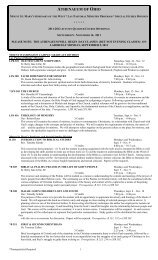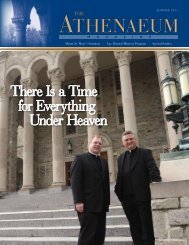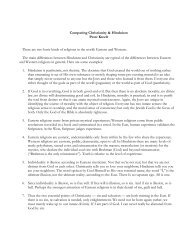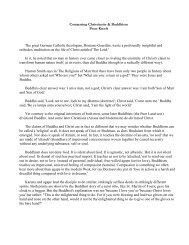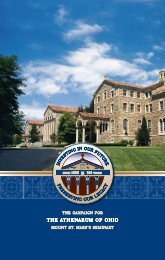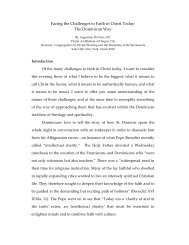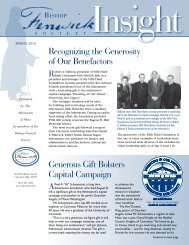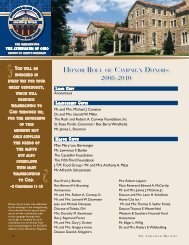Notes from Gathered for the Journey Six (6) essays David McCarthy
Notes from Gathered for the Journey Six (6) essays David McCarthy
Notes from Gathered for the Journey Six (6) essays David McCarthy
You also want an ePaper? Increase the reach of your titles
YUMPU automatically turns print PDFs into web optimized ePapers that Google loves.
cosmos and <strong>the</strong> place of human beings within it. The one God was <strong>the</strong>unique source of all that is, Lord of every time and place.‖ (70)―To introduce a second god would be to compromise <strong>the</strong> universal scope of God‘s powerand love.‖ (70) [―second‖ god was <strong>the</strong> Jesus, <strong>the</strong> Son of God]Christian belief in <strong>the</strong> divinity of JesusDebate; when did <strong>the</strong> tradition of Christ‘s divinity arise? B. looks to recentscholarship that argues that ―<strong>the</strong> divinity of Jesus can be found in <strong>the</strong> earliestwriting of <strong>the</strong> New Testament.‖Admittedly, not direct statement—hard in <strong>the</strong> powerful mono<strong>the</strong>istic culture ofJudaismBut, indirection, by (1) seeing Jesus as object of worship and ―(2) ascribing to himthings that could only be true of God.‖ (70)B. quotes Paul‘s great hymn in Philippians (2: 6-11), discussing its implications<strong>for</strong> Christ‘s divinity. (71)Jesus’ Resurrection <strong>from</strong> <strong>the</strong> DeadAlso, <strong>the</strong> resurrection <strong>from</strong> <strong>the</strong> dead roots its warrant in Christ‘s divinity. Paul―identifies this as <strong>the</strong> moment when God bestows upon him <strong>the</strong> divine name, sothat even though he had been ―in <strong>the</strong> <strong>for</strong>m of God‘ prior to his birth, he now isacknowledged and worshiped as God by creatures.‖ (71)Thus in this very early Christian writing we find Jesus presented as one whoreceives those things that are <strong>the</strong> sole prerogative of God. Faith in <strong>the</strong>divinity of Jesus lies at <strong>the</strong> very origin of Christianity (71Experience of <strong>the</strong> Risen ChristThe disciples‘ experience of <strong>the</strong> risen Christ helps <strong>the</strong>m ―to understand Jesus‘own attitude during his earthly ministry. Jesus had consistently acted as if one‘sadherence to him took precedence over any of Israel‘s religious institutions,whe<strong>the</strong>r this be <strong>the</strong> law or <strong>the</strong> temple.‖ (71)Gospel of JohnThe trajectory of St. Paul reaches its fulfillment in <strong>the</strong> Gospel of John. (72)St. Thomas—―My Lord, and my God.‖ (Jn. 20:28)The Holy Spirit as ―ano<strong>the</strong>r Advocate‖ (Jn. 14:160B. traces <strong>the</strong> history of sorting out <strong>the</strong> relationship of Fa<strong>the</strong>r, Son and Holy Spriit(71ff.)Early Theological ―Land Mines‖: subordinationism and modalism.Know such terms--solutions as1. ―subordinationism‖ argues that <strong>the</strong> Fa<strong>the</strong>r is totally God; Son and Holy Spiritsubordinate—in an odd middle ground; between God and creation. (72) BothJesus and Holy Spirit are created by God <strong>the</strong> Fa<strong>the</strong>r. This subordination leadsFundamental Moral Theology Page 20 of 54Class <strong>Notes</strong> – Fa<strong>the</strong>r Michael Seger



